Vietnam has become the latest country to dump its nuclear power plans – and to rule nuclear out of its energy mix for the foreseeable future – after the the country’s National Assembly voted on Thursday to abandon plans to build two new plants in partnership with Russia and Japan.
The Vietnamese government said in a statement that the decision, made in a closed session of parliament, was taken for economic reasons, after the price for the proposed plants – approved in 2009 – had doubled to nearly 400 trillion dong, or $US18 billion.

The Vietnamese government’s public debt issues, combined with decreasing local power demand, helped to seal the deal.
According to Reuters, when the government first approved plans for the two plants, growth in Vietnam’s annual power demand was projected at 17-20 percent.
However, Duong Quang Thanh, chairman of state utility Vietnam Electricity group, was quoted by state-run Voice of Vietnam radio recently as saying that annual growth between 2016 and 2020 was now forecast at 11 per cent, and 7-8 per cent through 2030.
The two plants proposed for Vietnam’s central Ninh Thuan province would have had a combined capacity of 4,000MW and were to be developed with assistance from Russian state company Rosatom and the Japanese consortium JINED.
As Reuters reports, the vote to scrap them deals a blow to both the global nuclear energy trade, and to Japan’s efforts at exporting reactors, after the Fukushima disaster brought its domestic nuclear industry to a grinding halt.
Since the Fukushima disaster in Japan in 2011 – in which the Daiichi nuclear plant was sent into meltdown after being hit by tsunamis triggered by a massive earthquake – countries from Germany to Indonesia have decided to either pull out of nuclear energy or cancel development plans.
And just yesterday, another earthquake off the coast of the Fukushima prefecture – this time resulting in a much smaller tsunami – offered a timely reminder of the dangers of having nuclear power on Japan’s east coast.
As CNBC reported, the scare, which caused only a minor disruption at Tepco’s Daini nuclear power plant, didn’t last long but was enough to generate fear in a country still reeling from the 2011 disaster.
“These events do reinforce the idea that there are issues with having nuclear power in Japan. So there could be another rise in the sentiment against nuclear power,” said Takuji Okubo, principal and chief economist at Japan Macro Advisors.
In Vietnam, meanwhile, Russia’s Rosatom is not giving up all hope.
“We respect our customer’s position, and we are ready to provide the full support to Vietnam when the country continues the implementation of its national nuclear power program,” Russia’s Rosatom said in an emailed comment to Reuters.
But the economics of nuclear would have to improve significantly for this to happen. As Duong Quang Thanh, the CEO of state-run Electricity of Vietnam Group – which was to cover the remaining costs of the plants – has put it, even with significant subsidies the plants were “not economically viable because of other cheaper sources of power.”
Nuclear power “cannot compete economically with other sources of energy,” Thanh said in a Deutsche Welle report.








